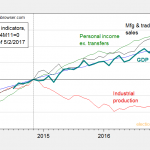George Soros is a rich and powerful man. He is chairman of Soros Fund Management which has brought huge returns for investors over several decades and he is known as the man who “broke” the Bank of England back in September of 1992, when he risked $10 billion on a single currency speculation by shorting the British pound. He turned out to be right, and in a single day the trade generated a profit of $1 billion or as was later reported, closer to $2 billion.
Soros is also been accused of speculative attacks that triggered the 1997 Asian financial crisis when he took a large bet against the Thai baht.
Soros is now targeting China by asserting that he shorted a large volume of Asian currencies—mainly the Chinese renminbi and the Hong Kong dollar.
Soro’s criticism of the world’s second largest economy began with a speech earlier this month when he said China’s economic situation “amounts to a crisis,” drawing parallels with the dark days of 2008. He pointed to an estimated $676 billion that China ‘lost’ in 2015, more than the $111 billion that fled all emerging markets — including China — in 2014.
THE NORMALLY STABLE YUAN, WHOSE VALUE IS CLOSELY CONTROLLED BY BEIJING, HAS COME UNDER PRESSURE IN RECENT WEEKS AND MONTHS IN OVERSEAS MARKETS AND FROM CAPITAL OUTFLOWS.
At the World Economic Forum in Switzerland last week, the billionaire and famous philanthropist blamed the Chinese economy for the bearish outlook weighing on global markets and suggested that a ‘hard landing’ for China involving a disruptive collapse in the country’s economic growth was “practically unavoidable.”
China itself reported last week that it has had the slowest annual economic expansion in 25 years and that it is uncertain how to break the cycle as nervous investors pull their money out of the country in search of better returns elsewhere. This has been putting even greater downward pressure on the yuan.












Leave A Comment